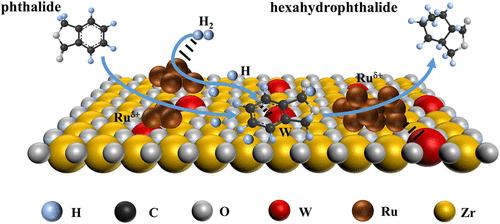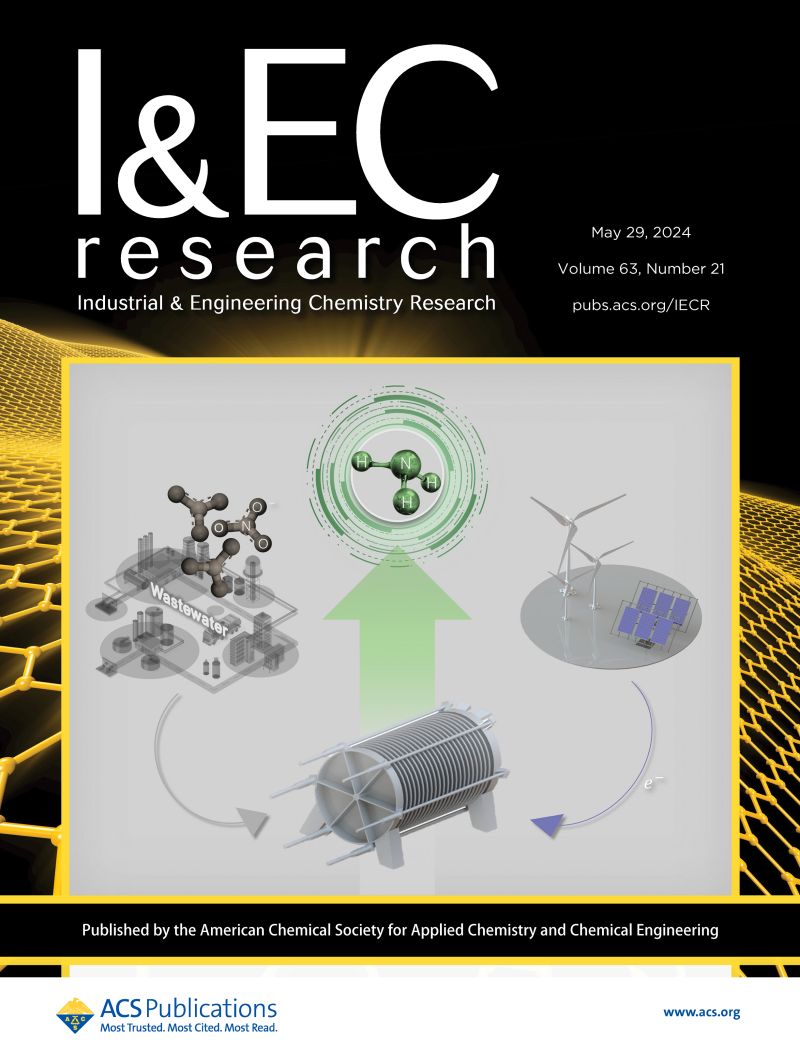钨调Ru/ZrO2催化剂促进邻苯二甲酸选择性加氢制六氢邻苯二甲酸:金属-载体相互作用和酸性特性的协同效应
IF 3.9
3区 工程技术
Q2 ENGINEERING, CHEMICAL
引用次数: 0
摘要
由内酯开环聚合单体六氢酞衍生的化学可回收聚酯的开发为解决塑料污染问题提供了一个有希望的解决方案。邻苯二甲酸选择性加氢制六氢邻苯二甲酸是一条绿色原子经济途径;然而,含不同官能团的邻苯二甲酸酯中苯环的选择性加氢是一个重大的挑战。本文通过浸渍-液相还原法制备了一系列w修饰的Ru/ZrO2催化剂,并系统评价了负载钨对邻苯酞加氢催化性能的影响。在4 MPa H2和180℃条件下,Ru/15WZr催化剂的邻苯酞转化率和六氢邻苯酞选择性分别达到98.6%和80.4%。与Ru/ZrO2相比,它具有较低的活化能(51.49 kJ/mol)和优异的催化稳定性,110 h的催化性能基本保持不变。W的引入增强了Ru与载体的相互作用,形成了缺电子的Ruδ+结构和丰富的酸性位点。这导致了邻苯酞芳环的定向活化和加氢,从而提高了六氢邻苯酞的选择性。这项工作不仅为高效加氢催化剂的设计提供了基本的见解,而且通过精确控制活性位点,建立了将邻苯二甲酸酯转化为可回收内酯的通用策略。本文章由计算机程序翻译,如有差异,请以英文原文为准。

Tungsten-Modulated Ru/ZrO2 Catalysts Promote Selective Hydrogenation of Phthalide to Hexahydrophthalide: Synergistic Effects of Metal–Support Interaction and Acidic Characteristics
The development of chemically recyclable polyester derived from lactone ring-opening polymerization monomer hexahydrophthalide offers a promising solution to the plastic pollution issue. The selective hydrogenation of phthalide to hexahydrophthalide is a green atom-economy route; however, the selective hydrogenation of the benzene ring in phthalide containing different functional groups is a significant challenge. In this work, a series of W-modified Ru/ZrO2 catalysts were prepared via impregnation followed by liquid-phase reduction, and the effect of tungsten loading on catalytic performance was systematically evaluated for the hydrogenation of phthalide. Under 4 MPa H2 and 180 °C, the conversion of phthalide and the selectivity of hexahydrophthalide reach 98.6% and 80.4% on the Ru/15WZr catalysts, respectively. Compared to the Ru/ZrO2, it has a relatively low activation energy (51.49 kJ/mol) and excellent catalytic stability, with 110 h of catalytic performance remaining basically unchanged. The introduction of W species enhances the interaction between Ru and the support, generating an electron-deficient Ruδ+ structure and abundant acidic sites. This leads to the directional activation and hydrogenation of the aromatic ring of phthalide, thereby improving the selectivity of hexahydrophthalide. This work not only provides fundamental insights into the design of efficient hydrogenation catalysts but also establishes a versatile strategy for converting phthalide to recyclable lactones through precise control of the active sites.
求助全文
通过发布文献求助,成功后即可免费获取论文全文。
去求助
来源期刊

Industrial & Engineering Chemistry Research
工程技术-工程:化工
CiteScore
7.40
自引率
7.10%
发文量
1467
审稿时长
2.8 months
期刊介绍:
ndustrial & Engineering Chemistry, with variations in title and format, has been published since 1909 by the American Chemical Society. Industrial & Engineering Chemistry Research is a weekly publication that reports industrial and academic research in the broad fields of applied chemistry and chemical engineering with special focus on fundamentals, processes, and products.
 求助内容:
求助内容: 应助结果提醒方式:
应助结果提醒方式:


